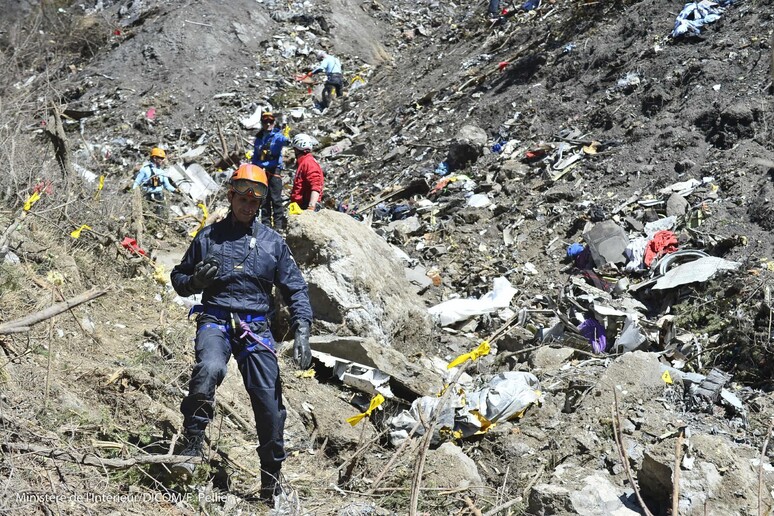Germanwings co-pilot Andreas Lubitz, who deliberately crashed his plane killing 150 people, "hid" mental problems so severe that he was previously judged "unsuitable" during earlier flight training, according to media reports Friday.
The problems were widely reported to be to do with depression but Dusseldorf's university clinic denied this, without specifying what he was being treated for.
"Reports that (Lubitz) was being treated for depression are inaccurate," the clinic said without disclosing further details because patient-doctor confidentiality remains in force even after the patient's death under German law. "We will hand over patient records to Dusseldorf prosecutors investigating (the crash)," the clinic said. "We will cooperate without misgivings or hesitation".
Lubitz had obtained a sick note from his doctor before Tuesday's disaster when he locked the pilot out of the cockpit before initiating a 10-minute long descent that ended in the plane crashing into the French Alps.
All on board the Barcelona-Dusseldorf flight, including Lubitz, a German citizen, were killed.
Investigators searching his home in Dusseldorf found evidence of "psychological illness", German newspaper Der Spiegel reported Friday.
He was being treated but apparently hid his illnesses from his employer and prosecutors said there found no evidence of religious or political motives for his actions.
Prosecutors in Dusseldorf added there was no sign of a suicide note among the papers seized from Lubitz's apartment.
Meanwhile, German newspaper Bild said that Lubitz had suffered from "severe depression" and at one time during training six years ago, was judged "unsuitable" for the job.
More recently, there was a "severe crisis" and possibly a breakup with his girlfriend, the newspaper said.
Lubitz's illnesses meant that he took a break from training and in 2009 was diagnosed with a "severe depressive episode" that resulted in about 18 months of psychiatric treatment, according to media reports.
French police said Friday that searchers could not find a single intact corpse from the crash scene but would instead try to identify through fingerprints. Counselling was also being made available for the searchers.
French prosecutor Brice Robin said Thursday that Lubitz was alive at the time of impact and could be heard breathing during the long descent, according to data retrieved from the cockpit black box.
But there was otherwise no noise from inside the cockpit and little doubt he had the "deliberate intention," to crash the plane, Robin added.
As a result of the disaster, Lufthansa - the parent company of Germanwings - said Friday that it would now be mandatory to have two people in the cockpit at all times.
A family friend later told German media that Lubitz had broken off his pilot training a few years earlier to seek treatment for depression.
The co-pilot had suffered "a burnout syndrome, a depression," German daily Frankfurter Allgemeine Zeitung said Thursday, quoting the mother of a childhood friend, who said Lubitz had confided in her.
Robin said there was no evidence to suggest the crash was a terrorist attack, and that the co-pilot's record showed no suggestion of terrorist connections.
The prosecutor said that the voice-recorder showed that initially during the flight, the pilot and co-pilot spoke normally.
But he said that Lubitz later became more "laconic" and after the pilot left the cockpit to go to the bathroom, the co-pilot locked him out.
The pilot could be heard begging to be let back in and eventually tried unsuccessfully to break down the door to get back to the controls as the descent began, the prosecutor said.
Lubitz was a native of Montabaur, in Rhineland-Palatinate region and was well-known as an avid member of a local glider club.
The prosecutor said that he would not refer to the co-pilot's actions as a suicide.
"One commits suicide alone, not when you have the responsibility for the lives of 150 people," said Robin.
"This is why I did not use the term 'suicide'".
Meanwhile, Lufthansa defended its pilot screening methods, saying that Lubitz had "passed all of his medical and psychological tests with flying colours", Lufthansa CEO Carsten Spohr said.
"We have to accept that the plane was deliberately brought down," said Spohr.
He echoed the prosecution statement that the disaster could not be considered a suicide.
"When someone drags another 149 people with him to death it's not suicide, it's something else," Spohr said.
ALL RIGHTS RESERVED © Copyright ANSA











